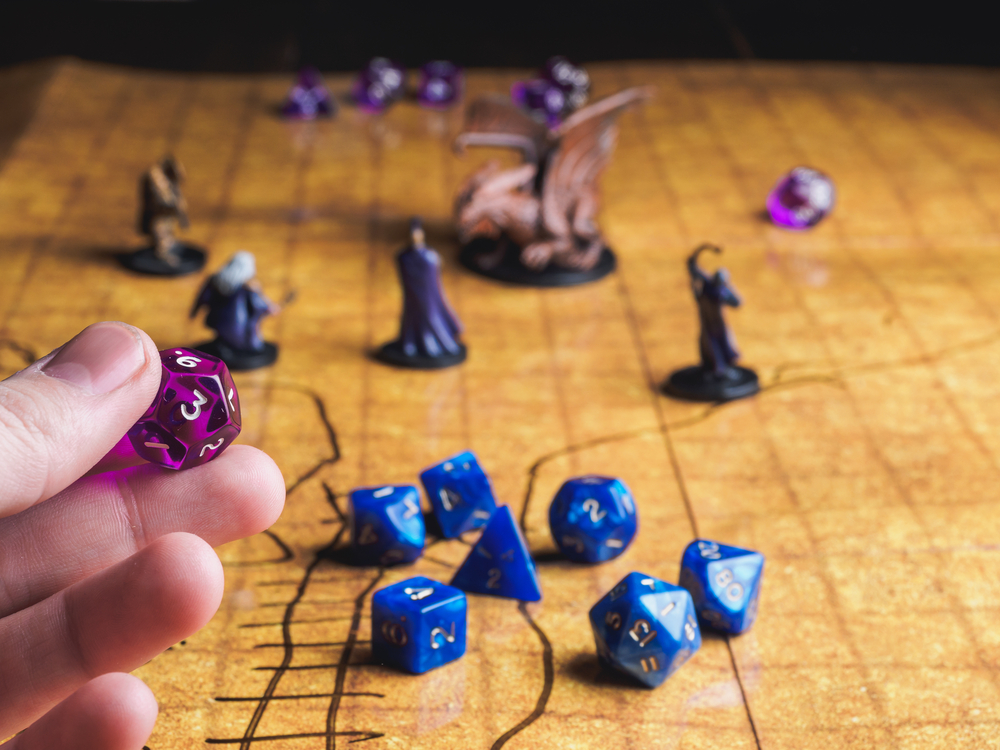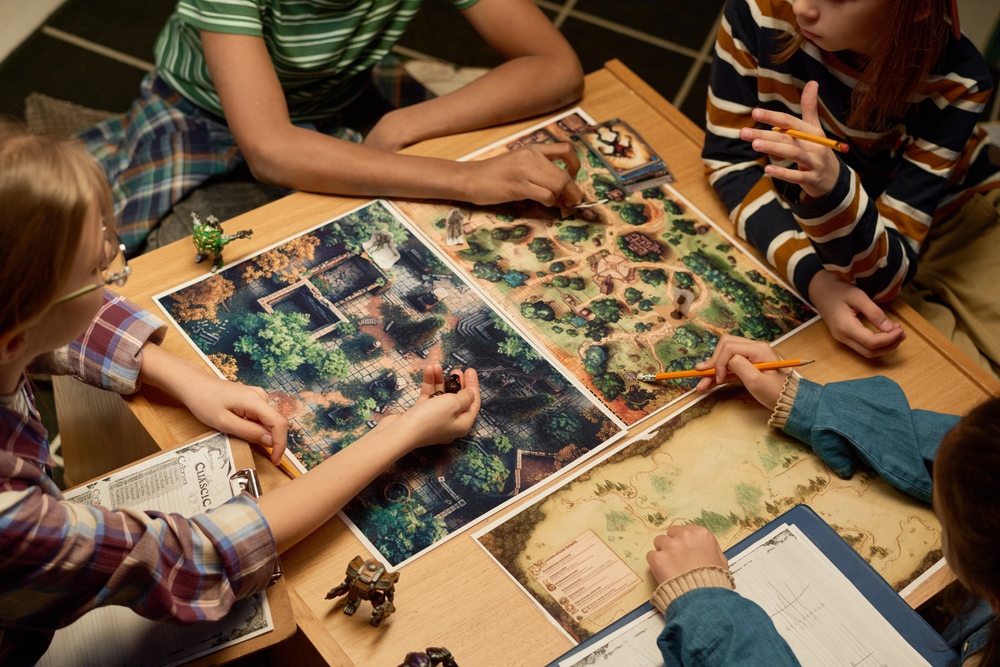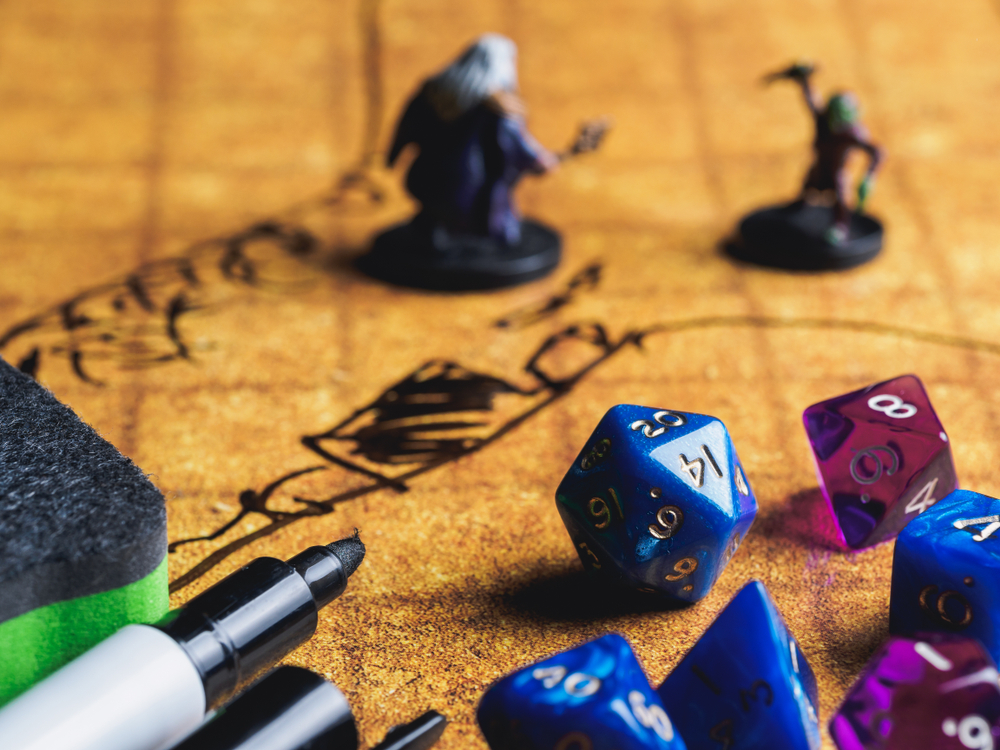Role-playing board games (RPGs) have been a significant part of the gaming world for decades, offering players a chance to immerse themselves in fantastical worlds and step into the shoes of unique characters. From their humble beginnings in the 1970s to the highly sophisticated games we play today, RPGs have undergone a fascinating transformation. As these games evolved, so did their popularity, their complexity, and their ability to create unique, memorable experiences. This blog will explore the evolution of role-playing board games, from the groundbreaking creation of Dungeons & Dragons to the modern classics that continue to define the genre today.
The Birth of Role-Playing Games
The story of role-playing board games begins with the revolutionary creation of Dungeons & Dragons (D&D) in 1974. Developed by Gary Gygax and Dave Arneson, D&D combined the mechanics of traditional wargames with a storytelling element, allowing players to assume the roles of adventurers in a fantastical world. The game’s innovative use of dice rolls to determine the outcome of actions, as well as its intricate character development system, made it a groundbreaking development in the gaming world. D&D not only created an entirely new genre of games but also laid the foundation for the deep, narrative-driven experiences that are common in modern RPGs.
The initial reception of D&D was a mix of excitement and skepticism. Many players, particularly those in the tabletop wargaming community, were intrigued by the concept, while others were resistant to the idea of incorporating storytelling into a traditionally strategic and competitive genre. Despite early criticism, Dungeons & Dragons quickly gained a cult following. It sparked a broader interest in role-playing games, leading to the creation of many other games that followed a similar structure. These early RPGs set the stage for a burgeoning subculture, with players meeting in basements and living rooms to embark on epic campaigns.
The Rise of Tabletop RPGs and Their Expanding Influence
As the 1980s rolled around, RPGs began to take on more complex forms, and the genre began to expand beyond the confines of Dungeons & Dragons. While D&D remained the gold standard, other games emerged with unique mechanics and settings that appealed to different audiences. Titles such as Warhammer Fantasy Roleplay (1986) and Shadowrun (1989) introduced players to new worlds, such as a dystopian cyberpunk future or a darker, more mature version of fantasy. These games built upon the core principles established by D&D but added layers of complexity, such as new combat systems, advanced character traits, and unique settings.
Throughout this period, role-playing games began to attract a more diverse crowd, with players coming from all walks of life. This period saw the rise of the RPG “community,” with conventions, fan clubs, and online forums dedicated to discussing the mechanics, campaigns, and character builds of their favorite games. As RPGs became more mainstream, the gaming market began to grow, and a greater variety of RPGs appeared on store shelves.
The increasing popularity of tabletop RPGs during the 1980s also coincided with the rise of video games, especially in the early 1990s. With the advent of more advanced computer systems and game consoles, many video games began to borrow from the rich mechanics of tabletop RPGs. Titles such as The Elder Scrolls series and Final Fantasy introduced players to expansive digital worlds where they could take on the roles of complex characters in epic stories. This influence of tabletop RPGs on video games signaled the expanding reach of role-playing games and their influence on a wider gaming culture.
The Golden Age of Modern Board RPGs
The late 1990s and early 2000s marked the golden age of modern role-playing board games. This period saw an explosion of creativity, with game designers pushing the boundaries of traditional RPGs. Some of the most iconic games of this period, such as Gloomhaven (2017) and Descent: Journeys in the Dark (2005), introduced new mechanics and ways of playing, incorporating elements from card games, strategy games, and even cooperative games. These innovations made RPGs more accessible to a broader audience while maintaining the immersive narrative experience that had always defined the genre.
One of the key factors that led to the explosion of RPGs in this era was the growing popularity of cooperative gameplay. In many of these games, players work together to achieve a common goal, rather than competing against one another. This shift in the dynamic of RPGs reflected a broader trend in board games overall, as cooperative games became increasingly popular. Games like Pandemic (2008) and Forbidden Island (2010) showcased how working together as a team could provide a unique challenge and foster camaraderie among players. This change in gameplay mechanics was mirrored in the evolution of role-playing board games, where collaborative storytelling became as important as individual character development.
Another noteworthy trend in modern RPGs is the emphasis on campaign-style play. Games like Gloomhaven offer lengthy, branching storylines that span dozens of sessions, allowing players to invest deeply in their characters and the world they inhabit. These long-form campaigns, often lasting many months or even years, have become one of the defining features of modern RPGs. They require players to maintain a consistent commitment to the game, creating a shared experience that is both memorable and deeply personal.
The Digital Age and the Integration of Technology in Role-Playing Games
As we move further into the 21st century, the line between traditional tabletop RPGs and digital games continues to blur. While many role-playing games still rely on physical game pieces, dice, and paper-based character sheets, a growing number of RPGs are incorporating digital tools to enhance the gameplay experience. For example, platforms like Roll20 and Fantasy Grounds allow players to connect remotely and play traditional tabletop RPGs online, complete with digital maps, character sheets, and automated dice rolls. This shift has made role-playing games more accessible than ever, enabling players to enjoy these experiences without geographical limitations.
The integration of technology into RPGs has also led to the creation of hybrid games, which combine the physical and digital elements in innovative ways. XCOM: The Board Game (2015) is one such example, using a companion app to drive the game’s narrative and offer players dynamic challenges as they battle aliens. These technological integrations open up new possibilities for game design, allowing for greater complexity and more immersive experiences.
Furthermore, digital apps and expansions have become increasingly common in board game stores, offering enhanced gameplay or streamlining the game process for newcomers. For example, Mansions of Madness (2016) uses an app to control elements of the game and create a more fluid, dynamic experience for players. These innovations have made role-playing board games even more appealing to modern audiences, as they integrate the excitement of technology with the traditional elements of tabletop gameplay.
Modern Classics and the Continuing Evolution
As we look toward the future of role-playing board games, it’s clear that the genre is far from stagnant. New games continue to push boundaries and explore new ways to tell stories, engage players, and incorporate technology. Games like Gloomhaven, Star Wars: Imperial Assault, and Twilight Imperium represent the cutting-edge of modern RPG design, offering innovative mechanics and engaging narratives that continue to captivate players around the world.
In many ways, the modern RPG genre is more diverse than ever before. There are games to suit every type of player, from those seeking deep, strategic gameplay to those looking for a more lighthearted and narrative-driven experience. The accessibility of modern RPGs, both in terms of complexity and digital integration, means that they are more inclusive, attracting players of all ages and backgrounds.
The evolution of role-playing board games is a testament to the creativity and passion of the gaming community. From the groundbreaking release of Dungeons & Dragons in the 1970s to the technological advancements of today, RPGs have continually adapted to the changing tastes and needs of their audiences. Whether you’re a veteran Dungeon Master or a newcomer to the world of RPGs, it’s clear that the genre will continue to evolve, providing immersive, unforgettable experiences for generations to come.
Conclusion
If you’re looking to discover new role-playing board games, or you’re in search of the latest modern classics, a board game store in Phoenix, AZ, is the perfect place to start your adventure. With a wide selection of titles to choose from, you can dive into the expansive world of RPGs and find a game that suits your style, whether you’re interested in a traditional fantasy campaign or a modern, tech-enhanced adventure. No matter what type of RPG you’re looking for, there’s sure to be something that will transport you into an unforgettable world of imagination and excitement.
Need Tabletop Games Near You?
Imperial Outpost Games is your one-stop shop for all things tabletop gaming. With a wide selection of board games, miniatures, and hobby supplies, we cater to all types of gamers. Our family-friendly store features games for children, families, and parties, making it the perfect spot for game night. As a locally owned business, we also offer a large game room for customers to come in and play their favorite games with friends and other members of the community. Contact us today to learn more about what we can do for you!



